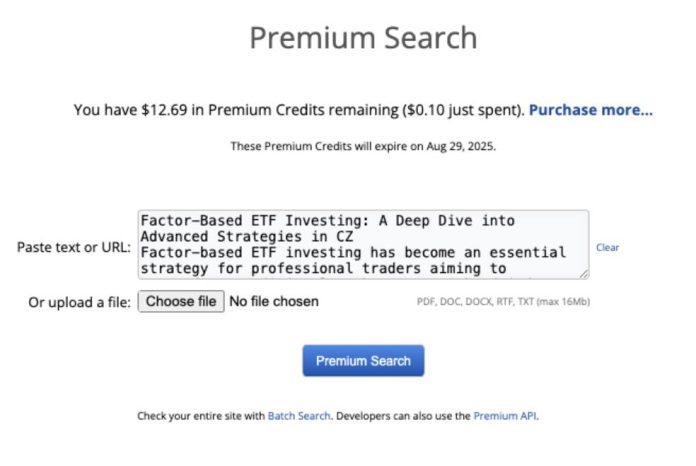Factor-based ETF investing has become an essential strategy for professional traders aiming to outperform traditional market-cap weighted indexes. By focusing on specific factors, such as value, momentum, or low volatility, traders can gain targeted exposure to market dynamics that often lead to enhanced returns. In the Central European market, especially in the Czech Republic (CZ), this approach is growing in popularity. For traders, understanding these strategies in-depth can unlock new opportunities and add sophisticated tools to their trading arsenal.
Understanding Factor-Based ETFs
Factor-based ETFs are designed to target specific investment characteristics, or “factors,” that influence asset performance. These ETFs provide an efficient way to gain exposure to stocks that share common traits, such as high-quality earnings, low volatility, or strong momentum.
Key Factors in ETF Investing
Several key factors drive performance in factor-based ETF investing:
- Value: Focuses on undervalued stocks, often measured by ratios such as price-to-earnings or price-to-book.
- Momentum: Targets stocks that are experiencing upward price trends, assuming that the trend will continue.
- Low Volatility: Prioritizes stocks with lower price volatility, offering a more stable, defensive investment.
- Quality: Invests in companies with strong fundamentals, such as high return on equity and low debt levels.
- Size: Focuses on the market capitalization of companies, with small-cap stocks often providing higher growth potential but increased risk.
By tailoring investments to these factors, professional traders can position themselves to exploit market inefficiencies.
Advantages of Factor-Based ETFs for Professional Traders
Factor-based ETFs offer several advantages, making them an attractive tool for professional traders:
Enhanced Portfolio Diversification
Factor ETFs allow traders to diversify their portfolios beyond simple sector or geographic allocation. By diversifying across factors, traders can reduce idiosyncratic risk while maintaining exposure to growth opportunities. For example, balancing low volatility with momentum factors can help mitigate risks while capturing upward market trends.
Targeted Exposure to Market Factors
One of the main benefits of factor-based ETFs is their ability to provide targeted exposure to specific market conditions. By investing in a momentum-focused ETF, traders can capitalize on stocks experiencing strong upward trends. Similarly, a value ETF allows them to tap into underpriced assets. This precision can be vital for traders looking to optimize short-term opportunities or hedge specific risks in their portfolios.
Risk-Adjusted Returns
Factor-based ETFs are designed to maximize risk-adjusted returns. By choosing factors that align with market conditions, traders can achieve higher returns while managing downside risks. For example, a low-volatility ETF may underperform during bull markets but provide essential protection during periods of market stress, thus improving the overall risk-return profile of a portfolio.
Efficiency and Liquidity
Factor-based ETFs also offer the benefit of liquidity and cost efficiency. They trade like traditional ETFs, meaning that professional traders can easily enter and exit positions without significant slippage. Additionally, management fees tend to be lower than those associated with actively managed funds, giving traders more cost-effective access to sophisticated investment strategies.
Key Strategies for Factor-Based ETF Investing
Successful factor-based ETF investing requires a strategic approach. Here are some advanced strategies professional traders can implement:
Single-Factor vs. Multi-Factor Strategies
Traders can choose between single-factor and multi-factor strategies, depending on their goals. Single-factor ETFs focus on one specific factor, such as momentum or value. While these funds can outperform in specific market conditions, they also come with heightened risks if the targeted factor falls out of favor.
Multi-factor ETFs, on the other hand, combine several factors to balance risk and reward. These funds are less likely to experience sharp declines when a single factor underperforms, as the diversification across factors provides a natural hedge.
Tactical Factor Rotation
Tactical factor rotation involves shifting between different factor ETFs based on current market conditions. For instance, traders might allocate more to value-based ETFs during market recoveries when undervalued stocks are expected to rebound. Conversely, during periods of economic expansion, momentum-based ETFs might outperform.
Implementing factor rotation requires a deep understanding of economic cycles and the ability to anticipate shifts in market sentiment. For professional traders, this strategy can offer significant upside but requires close monitoring and tactical adjustments.
Practical Considerations for Trading Factor-Based ETFs in CZ
Trading factor-based ETFs in the CZ market comes with unique considerations:
- While factor-based ETFs offer liquidity, traders should be mindful of trading costs, including spreads and potential slippage. Ensuring adequate liquidity is essential, particularly when executing large trades.
- Since many factor-based ETFs track international indices, currency risk is a major concern. Movements in the Czech koruna (CZK) relative to other currencies can impact the performance of ETFs with foreign holdings. Professional traders often use currency hedging strategies to mitigate this risk.
- The regulatory environment in CZ is relatively friendly for ETF investment. However, it’s important to stay updated on tax regulations and any potential changes that could impact investment strategies.
Conclusion
Factor-based ETF investing offers professional traders a sophisticated way to optimize returns and manage risk. In the CZ market, where unique economic conditions create opportunities for factors like momentum and value, traders who apply these strategies effectively can gain a competitive edge. Whether rotating between factors or building a long-term portfolio, understanding the nuances of factor-based ETFs is key to success in today’s markets.
Disclaimer: This is a paid advertorial


